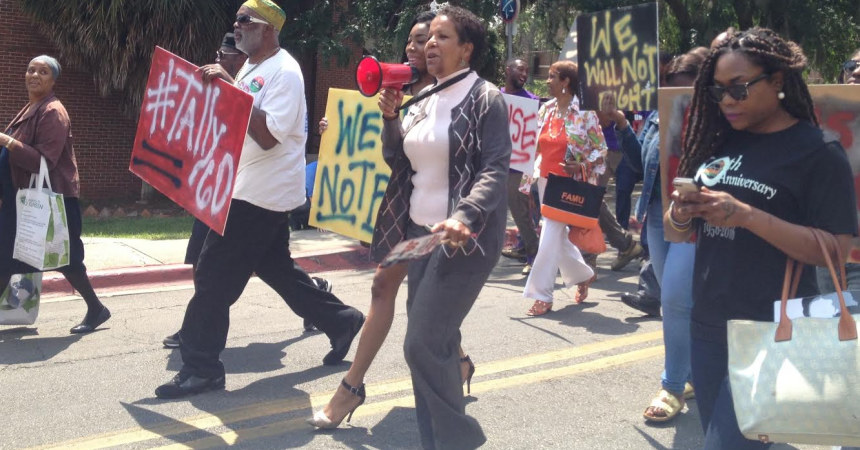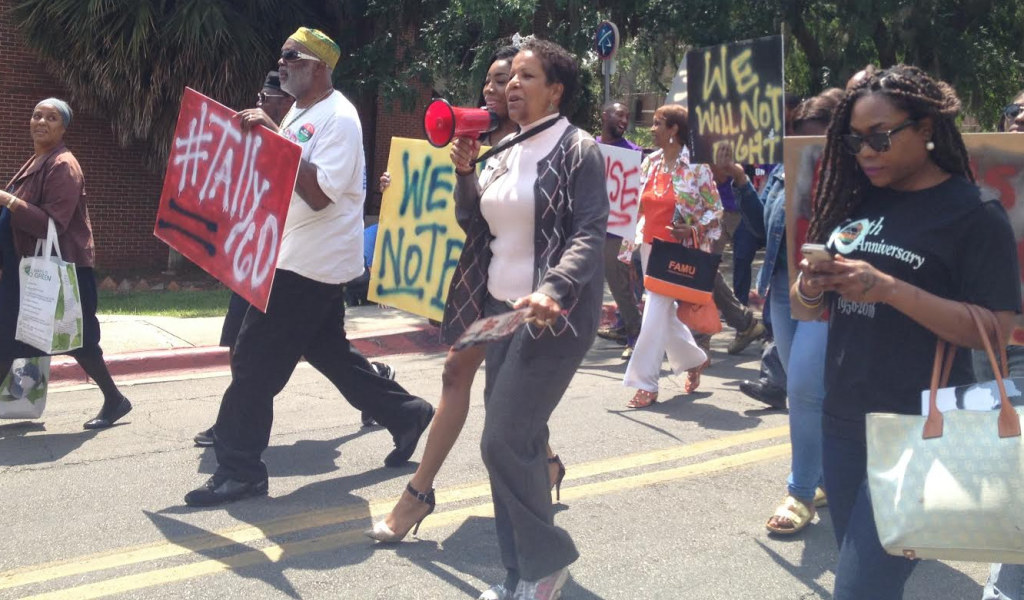
Bus boycott serves as backdrop to call for Black history awareness

Marchers make their way to Lake Anita where ceremonies were held to celebrate the 60th anniversary of a bus boycott led by FAMU
students Wilhelmina Jakes and Carrie Patterson.
Photo by St. Clair Murraine
By St. Clair Murraine
Outlook writer
Derek Steele wasn’t born when his parents’ home was shot up by the Ku Klux Klan, but the bullet holes that were still there years later gave him insight to what Blacks in Tallahassee endured for decades.
He’d also heard conversations between his father Rev. C.K. Steele and other civil rights activists about their torturous past. His recollection is vivid to the point that he admitted being troubled by what he’d heard and the bullet holes in the screens and walls of their home on the corner of MLK Boulevard and Tennessee St.
“I had a tinge of racism in my system,” the younger Steele said.
But through it all, he said he learned to appreciate the fight that his father and other foot soldiers endured during the 1950s and ‘60s.
What he knows about the past has given him a greater understanding of the continued push for civil and equal rights, Steele said.
And, finding ways to instill that same understanding was one of the key topics that were discussed last week, with the 60th anniversary of the Tallahassee bus boycott as the backdrop. FAMU students Wilhelmina Jakes and Carrie Patterson started the bus protest by sitting in an area designated for “Whites only.”
The story of Patterson and Jake, along with the effort of other foot soldiers was a resounding theme during a panel discussion in FAMU’s grand ballroom. They insisted that young people should recognize the connection between history and events of the present time.
There was a consensus that what happened – from the bus boycott to marches led by Martin Luther King Jr. in the South – isn’t much different from injustices seen today, said Dot Inman Johnson, one of the panelists.
“We have failed in our duty to make our history relevant to our own children,” said Inman Johnson, who was Tallahassee’s first Black female mayor. “Too many people treat the civil rights movement of the ‘50s and ’60s as though there was a closing date on the movements.”
Moderator Shauna Smith weighed in by reminding the audience that the onus is on families to educate their children on civil rights issues.
There has to be a unified diligent effort, said David Jackson, dean of graduate studies at FAMU. He appealed for Black history to be taught as a part of secondary education curriculum.
“When I teach, especially the civil rights movement, I emphasize that history is a way of remembering, but it can also be a way of forgetting,” Jackson said. “If we’re not diligent about writing about our past and highlighting individuals that played such a vital role in securing our rights and providing a foundation for us to move forward, then it could easily be forgotten.”
The hour-long conversation was a prelude to a march from the ballroom on MLK Boulevard to Lake Anita along FAMU Way. Marchers carried signs, some with a non-violence message. Others simply said, “Rise.”
Smith was in the thick of the crowd carrying a small red bull horn as they chanted, “The people united will never be defeated.”
The march was a depiction of events that followed a 1956 boycott of private buses in Tallahassee, led by FAMU students Wilhelmina Jakes and Carrie Patterson. They set off a month-long protest after they sat in the “whites only” section.
Both were arrested for refusing to ride in the designated colored section in the back of the segregated bus.
“It was a very tense time,” said another of Steele’s sons, Henry Marion, recalling the events before and after the bus boycott. “Very tense in Tallahassee.”
The scene was more celebratory later in the day at Lake Anita, where a bus-load of foot soldiers or their children pulled up on a Star-Metro bus as a reminder of what took place 60 years ago.
“We are reminded of the disparities when we consider economic inequalities that still exist in our communities,” said Mayor Andrew Gillum. “While today we recognize and celebrate our history, we also are to reassert ourselves to the challenges that confront this community; recommit ourselves to work very, very hard so that the next generation that comes after us; the kids that I’m raising that they have it easier when they find themselves fighting the same battles that we fight today.”







